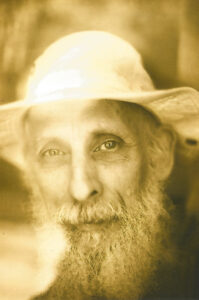For much of the Christian Church, today is Pentecost Sunday. It commemorates the day when the Holy Spirit, previously breathed into the eleven disciples by the risen Christ1, fell upon ten dozen assembled believers2. Peter, standing among them, explained to astonished bystanders that this was the “outpouring of God’s spirit upon all flesh” foretold in Joel 2:28-32.
Much is made of this “baptism of the Holy Spirit” by Christians today, but there is no agreement among them all about what it does, or how you can tell whether you’ve received it. Some suppose that it unlocks “speaking in tongues;” others think it comes along with any ordinary water-baptism and guarantees admission to Heaven after death. But the early Quakers were emphatic that it was known by this specific fruit: the answer, or confession, of a good conscience toward God3. This meant sinlessness, and many in their time thought this was impossible, as many do today also. And it may be impossible for unaided men and women, driven as we are by fear, anger, pride, lust, addictions, and self-interest! But those Quakers knew, by experience, that Christ, who indwells all humans and reproves us all for our sins, also heals the inner sickness that compels us to sin – if we are willing to be healed. We have to say yes to our Savior to receive this blessing. It does not matter whether our culture tells us to call our Savior Jesus Christ, or Allah, Higher Power or Great Spirit. The Savior will know if we are sincere.
We then become new creatures. We keep memories of old misbehaviors and may continue to feel shame over them. Addictive cravings may persist, crying for a cigarette, or whatever we used to turn to for cheap stress relief. We may still feel temptations to tell lies, act selfishly, or carry on a sin-filled fantasy life. But the compulsion to do those things has been uprooted. Desire dawns in us to do them no more.
There are two places in Scripture where the term new creature or new creation occurs, depending on which translation of the Bible you use. Paul’s original Greek reads kainē ktísis and ktísis can mean either “creature” or “creation.” At the end of the Epistle to the Galatians:
But God forbid that I should glory, save in the cross of our Lord Jesus Christ, by whom the world is crucified unto me, and I unto the world. For in Christ Jesus neither circumcision availeth anything, nor uncircumcision, but a new creature.4
And in the Second Epistle to the Corinthians:
Therefore if any man be in Christ, he is a new creature: old things are passed away; behold, all things are become new.5
All the early English translations of the Bible speak of “a new creature,” and most of the more modern ones, “a new creation.” There’s no telling which word Paul would have preferred; but the fact is, when our heart is changed, the world we see changes also. If our heart is fearful, angry, and guilty, the world feels hostile.6 By their attachment to atrocity stories, Jesus knew that certain people who came to Him needed repentance.7 When newly-gained purity lets us feel God’s love and know God’s trustworthiness, we can say, with Paul, “We know that all things work together for good for those who love God.”8 We have not grown indifferent to the cruelty and hypocrisy all around us, but we become all-forgiving. Yes: we become all-forgiving. I draw your attention to a statement Jesus made in His Sermon on the Mount, right at the end of what we call The Lord’s Prayer:
For if you forgive others their trespasses, your heavenly Father will also forgive you; but if you do not forgive others, neither will your Father forgive your trespasses.9
I’ve learned to read this, not as a warning about an unforgiving Father who refuses to be merciful, but as a warning that the unmerciful heart closes itself off from receiving mercy, even from God. I also read this as a declaration of God’s boundless forgiveness, for God would not ask us, creatures, to be all-forgiving if God were not also all-forgiving. “He that planted the ear, shall he not hear?” sang the Psalmist.10 I answer: “He that planted the moral sense, shall He not show an even more perfect one?”
I stress the all-loving, perfect goodness of God because I must also, in preaching God’s everlasting gospel, warn of a dreadful judgment coming to us all, in which our own conscience makes vivid to us all the suffering we’ve caused. At the same time, I have a mission to comfort the fearful: there is a salvation in process, which God intends all creatures to enjoy.11 But there is no seeing of such glorious salvation, such a wonderfully good world, without a radical change in who we are. And this is why Paul writes of being “crucified to the world,” and of “dying and being resurrected with Christ,” as something that not only he had to undergo, but that every follower of Christ must expect to undergo – in this lifetime. Crucifixion is painful, and the losses we undergo with death, sweeping. Putting to death the “old self with its sins” is necessary for us to become “born again” or “born from above” during this lifetime.12 But there is no other way into Christ’s Kingdom, in which God will wipe away every tear from our eyes.13 Do not fear: your Shepherd will walk you through the process.
I’m addressing you as if I might never have your attention again, so I must say all that’s on my heart today. I have a last point to make about the New Creature and the New Creation: if you’re beginning to experience this baptism of the Holy Spirit that makes you into a new creature and causes you to walk in a new creation, find others who know what you’re talking about! If there are none in your worshiping community, bring the good news to them – make converts if you can. You have a Shepherd who will give you “a mouth, and wisdom” for this purpose.14 If no one there will hear you, find a new worshiping community that can hear and support you. Trust your Shepherd to lead you to them.
1 John 20:22. As I read the Greek enephýsēsen, He breathed into them rather than “on them,” perhaps mouth-to-mouth.
2 Acts 2:1-36.
3 1 Peter 3:21 KJV, as cited in Robert Barclay, Apology for the True Christian Divinity (1678), Prop. 12, §IV, and A
Catechism and Confession of Faith (1673), §: “Concerning Baptism, and Bread and Wine.”
4 Galatians 6:14-15 KJV.
5 2 Corinthians 5:17 KJV.
6 “The wicked flee when no one pursues,” Prov 28:1a NRSV.
7 Luke 13:1-5.
8 Romans 8:28 NRSV. Cf. Titus 1:15, “To the pure all things are pure.”
9 Matthew 6:14-15 NRSV.
10 Psalm 94:9a KJV.
11 1 Timothy 2:3-4 NRSV reads: “…God our Savior… desires everyone to be saved and to come to the knowledge of the
truth.” The Greek thélei, here translated as “desires,” is more forceful: God wills everyone to be saved.
12 For references to the “old self,” with its “body of sin” and “lusts,” which must be “put to death,” see Romans 6:6 and
8:13, Ephesians 4:22, and Colossians 3:3-9. The original Greek of John 3:7 reads gennēthēnai ánōthen, equally translatable “to be born again” or “to be born from above.”
13 Revelation 7:17, 21:4.
14 Luke 21:15 KJV.

John Jeremiah Edminster (M. Div., Earlham School of Religion, 2019) worships regularly with Conservative Friends and hosts the Tuesday evening House of Light Friends’ Worship Group in his home in Richmond, Indiana. He carries a concern to promote surrender of self to Christ.

What does it mean to be a gathering space for thoughtful and creative reflections on the history, theology, and modern practices of the Church of the Brethren and related movements? Brethren Life & Thought has a long history of working to be such a space. We’re excited to bring our content online through DEVOTION: A Blog by Brethren Life & Thought. Here, you’ll find sermons and other writings from Brethren, Mennonite, and Quaker writers from a variety of theological and social contexts. Some weeks, you might read a piece that resonates with you. Some weeks, you might read a piece that challenges you. Some weeks, you might read a piece you think is heretical. For good or for ill, the Anabaptist and Peace Church movements are remarkably diverse in faith and practice. This blog attempts to expose our readers to the vastness of that diversity – even when it makes us uncomfortable. As you comment, which we highly encourage you to do back on our Facebook page, please remember to do so in light of our membership in the Body of Christ. Let us be different than the world for Jesus truly does invite us to another way of living.

